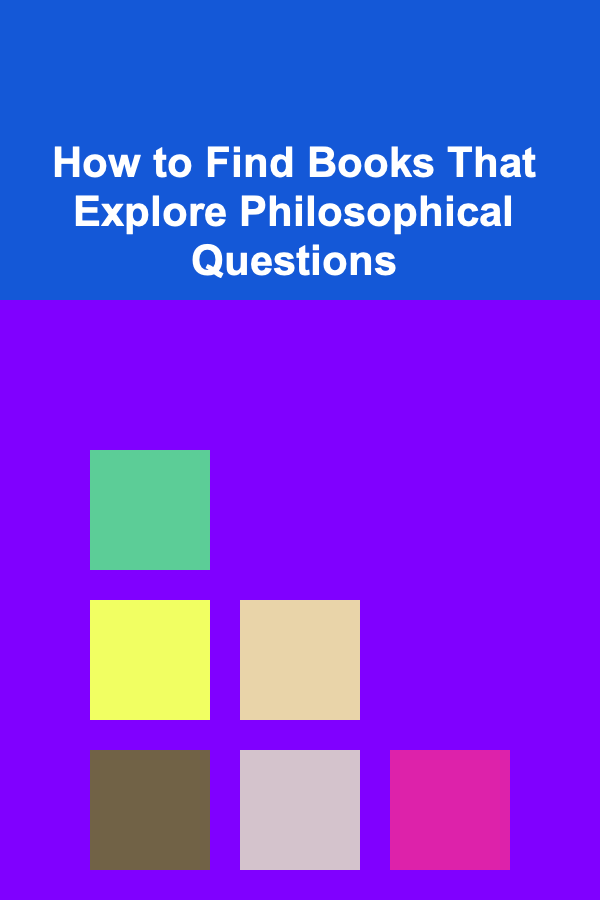
How to Find Books That Explore Philosophical Questions
ebook include PDF & Audio bundle (Micro Guide)
$12.99$11.99
Limited Time Offer! Order within the next:

Philosophy, at its core, is the pursuit of fundamental truths about ourselves, the world around us, and our place within it. It grapples with questions that often lack definitive answers, encouraging critical thinking, intellectual exploration, and a deeper understanding of the human condition. Finding books that effectively explore these philosophical questions can be a rewarding yet challenging endeavor. This guide provides a comprehensive approach to navigating the vast landscape of literature to discover works that delve into the depths of philosophical inquiry.
I. Understanding What Constitutes a "Philosophical" Book
Before embarking on the search, it's crucial to define what we mean by a "philosophical" book. This doesn't necessarily confine us to textbooks or works explicitly labeled as philosophy. Philosophical explorations can be found in various genres, including:
- Classical Philosophical Texts: These are the foundational works of philosophy, written by canonical thinkers such as Plato, Aristotle, Kant, Nietzsche, and Sartre. They directly address philosophical problems and offer systematic arguments.
- Contemporary Philosophy: Modern works that build upon or challenge classical ideas, addressing contemporary issues through a philosophical lens. Thinkers like Judith Butler, Slavoj Žižek, and Martha Nussbaum fall into this category.
- Philosophical Novels: Novels that embed philosophical ideas within their narratives, exploring complex moral dilemmas, questioning societal norms, and examining the nature of existence. Examples include Albert Camus' The Stranger , Fyodor Dostoevsky's Crime and Punishment , and Ursula K. Le Guin's The Dispossessed.
- Scientific Books with Philosophical Implications: Works in fields like physics, biology, and psychology that raise profound philosophical questions about the nature of reality, consciousness, and the universe. Examples include books by Stephen Hawking, Richard Dawkins, and Daniel Dennett.
- Historical and Biographical Works: Exploring the lives and thoughts of influential figures can provide insights into their philosophical beliefs and the historical context that shaped them. Biographies of philosophers, political leaders, and social reformers can be valuable resources.
- Poetry and Drama: Works like Shakespeare's plays or the poetry of T.S. Eliot often grapple with themes of mortality, morality, and the search for meaning, offering philosophical reflections through artistic expression.
Essentially, a philosophical book is one that prompts reflection on fundamental questions concerning:
- Metaphysics: The nature of reality, existence, time, and space.
- Epistemology: The nature of knowledge, belief, and justification.
- Ethics: Morality, values, and principles of right and wrong.
- Political Philosophy: Justice, governance, and the social contract.
- Aesthetics: The nature of beauty, art, and taste.
- Logic: Reasoning, argumentation, and the principles of valid inference.
II. Strategies for Finding Philosophical Books
Now that we have a clearer understanding of what constitutes a philosophical book, let's explore effective strategies for finding them:
A. Leveraging Online Resources
The internet provides a wealth of resources for discovering philosophical literature:
- Online Booksellers (Amazon, Barnes & Noble, etc.): Use keyword searches with terms like "philosophy," "ethics," "metaphysics," "existentialism," "moral philosophy," or specific philosophical schools of thought (e.g., "Stoicism," "Kantianism"). Explore related categories and "customers who bought this item also bought" suggestions.
- Goodreads and Similar Platforms: Goodreads allows you to browse lists created by other readers, such as "Best Philosophy Books," "Philosophical Novels," and "Introductory Philosophy Readings." Read reviews to gauge the content and suitability of a book.
- Stanford Encyclopedia of Philosophy (SEP): The SEP is an invaluable resource for learning about philosophical concepts and figures. Each entry includes a bibliography of relevant books and articles. Start with an SEP entry on a topic that interests you and explore the suggested readings.
- Internet Archive and Project Gutenberg: These websites offer free access to many public domain philosophical texts, including classic works by Plato, Aristotle, Descartes, and Kant.
- University and College Course Syllabi: Many universities publish their course syllabi online. Searching for "philosophy syllabus" or "ethics syllabus" can reveal reading lists used in undergraduate and graduate courses.
- Online Philosophy Journals and Blogs: Websites like the Notre Dame Philosophical Reviews, the Philosophers' Magazine, and various philosophy blogs often feature reviews and discussions of recent books in the field.
- Google Scholar: Search for philosophical articles on specific topics. The "cited by" feature can lead you to other relevant works, including books.
- Online Forums and Communities: Participate in online forums dedicated to philosophy (e.g., Reddit's r/askphilosophy) to ask for book recommendations and engage in discussions with other readers.
Example: Imagine you're interested in the philosophy of mind. You could start by searching "philosophy of mind books" on Amazon. You might then consult the Stanford Encyclopedia of Philosophy entry on "Philosophy of Mind" to gain a deeper understanding of the topic and explore the recommended readings.
B. Exploring Libraries and Bookstores
Don't underestimate the power of physical libraries and bookstores:
- Browse the Philosophy Section: Libraries and bookstores typically have dedicated philosophy sections. Take the time to browse the shelves and examine the books on display.
- Talk to Librarians and Booksellers: Librarians and booksellers are often knowledgeable about philosophy and can provide personalized recommendations based on your interests.
- Attend Book Readings and Author Events: Keep an eye out for events featuring philosophers or authors whose works explore philosophical themes.
- Use Library Databases: Libraries often subscribe to databases that allow you to search for books and articles by subject, author, or keyword.
- Interlibrary Loan: If your local library doesn't have a specific book you're looking for, they may be able to borrow it from another library through interlibrary loan.
C. Following Philosophers and Thinkers
Identifying philosophers or thinkers whose ideas resonate with you is a great way to discover new books:
- Read Their Works: Start by reading the philosopher's major works. Pay attention to the influences they cite and the thinkers they engage with in their writing.
- Explore Secondary Literature: Look for books and articles that analyze and interpret the philosopher's ideas. These secondary sources can provide valuable context and lead you to other relevant works.
- Follow Their Students and Colleagues: Philosophers often have students and colleagues who carry on their work and develop their ideas. Exploring their writings can provide new perspectives on the original philosopher's thought.
- Attend Lectures and Conferences: Attending lectures and conferences on philosophy can expose you to new ideas and thinkers.
Example: If you are interested in the philosophy of Friedrich Nietzsche, you would start by reading works like Thus Spoke Zarathustra and Beyond Good and Evil. Then, you might explore secondary literature by scholars like Walter Kaufmann or Alexander Nehamas. This can lead you to thinkers who influenced Nietzsche, such as Arthur Schopenhauer, or those who were influenced by him, such as Michel Foucault.
D. Considering Different Philosophical Traditions
Philosophy is a diverse field with many different traditions and schools of thought. Exploring these different traditions can broaden your horizons and lead you to new and interesting books:
- Western Philosophy: This is the dominant tradition in Europe and North America, encompassing thinkers from ancient Greece to the present day. It includes various sub-traditions, such as ancient philosophy, medieval philosophy, modern philosophy, and contemporary philosophy.
- Eastern Philosophy: This encompasses philosophical traditions from Asia, including Buddhism, Confucianism, Taoism, and Hinduism. These traditions often focus on spiritual and ethical development.
- Continental Philosophy: This is a branch of Western philosophy that emphasizes historical context, social critique, and existentialism. Key figures include Hegel, Marx, Nietzsche, Heidegger, Sartre, and Foucault.
- Analytic Philosophy: This is a branch of Western philosophy that emphasizes logic, clarity, and precision. It often focuses on language and the analysis of concepts. Key figures include Frege, Russell, Wittgenstein, and Quine.
- Feminist Philosophy: This is a philosophical movement that examines gender and its role in shaping our understanding of the world.
- Critical Race Theory: This is a theoretical framework that examines the role of race and racism in society.
Example: If you are primarily familiar with Western philosophy, you might consider exploring Eastern philosophical traditions such as Buddhism or Taoism. This could lead you to books like the Dhammapada or the Tao Te Ching, which offer different perspectives on the nature of reality and the path to enlightenment.
III. Refining Your Search: Identifying Specific Philosophical Questions
To further refine your search, consider focusing on specific philosophical questions that intrigue you. Here are some examples:
- The Problem of Evil: How can we reconcile the existence of a benevolent God with the presence of suffering in the world?
- The Nature of Consciousness: What is consciousness? How does it arise from physical matter?
- Free Will vs. Determinism: Do we have free will, or are our actions predetermined by factors beyond our control?
- The Meaning of Life: What is the purpose of human existence? What makes a life meaningful?
- The Justification of Political Authority: What justifies the power of the state over individuals?
- The Ethics of Artificial Intelligence: What ethical considerations should guide the development and use of artificial intelligence?
- The Nature of Truth: What is truth? How can we know what is true?
- The Problem of Personal Identity: What makes us the same person over time?
Once you have identified a specific question, you can use this to guide your search. For example, if you are interested in the problem of evil, you could search for books on "theodicy," "the problem of suffering," or "religious apologetics." You could also look for books by philosophers who have written extensively on this topic, such as Augustine, Leibniz, or Alvin Plantinga.
IV. Evaluating Philosophical Books
Not all books that claim to be philosophical are created equal. It's important to evaluate the quality and rigor of the arguments presented. Consider the following criteria:
- Clarity and Precision: Is the author's writing clear and easy to understand? Are the concepts and arguments well-defined?
- Logical Consistency: Are the author's arguments logically sound? Do the conclusions follow from the premises?
- Evidence and Support: Does the author provide evidence to support their claims? Are the arguments based on solid reasoning and credible sources?
- Counterarguments and Objections: Does the author address potential counterarguments and objections to their views? Are these counterarguments adequately addressed?
- Originality and Insight: Does the book offer new insights or perspectives on the philosophical questions it addresses?
- Scholarship and Research: Is the book well-researched and based on a thorough understanding of the relevant literature?
- Objectivity and Fairness: Does the author present different perspectives on the issue fairly and objectively? Are the arguments presented in a balanced and unbiased manner?
Example: When reading a book on ethics, consider whether the author clearly defines the moral principles they are advocating for. Do they provide logical arguments to support these principles? Do they address potential objections to their view, such as situations where the principles might conflict with each other or lead to undesirable consequences? A strong philosophical book will engage with these questions in a thoughtful and rigorous manner.
V. Recommended Starting Points
For those new to philosophy, here are some recommended starting points:
- Plato's The Republic: A foundational work of Western philosophy that explores justice, the ideal state, and the nature of reality.
- Aristotle's Nicomachean Ethics: A classic work on ethics that explores the nature of happiness and the virtues that lead to a good life.
- René Descartes' Meditations on First Philosophy: A groundbreaking work of modern philosophy that explores the nature of knowledge and the existence of God.
- Immanuel Kant's Groundwork of the Metaphysics of Morals: A seminal work on ethics that explores the categorical imperative and the concept of duty.
- John Stuart Mill's Utilitarianism: A classic defense of utilitarianism, the ethical theory that holds that actions are right in proportion as they tend to promote happiness.
- Bertrand Russell's The Problems of Philosophy: A clear and accessible introduction to some of the main problems of philosophy.
- Thomas Nagel's What Does It All Mean?: A concise and engaging introduction to philosophy for beginners.
- Sophie's World by Jostein Gaarder: A philosophical novel that introduces readers to the history of philosophy through an engaging narrative.
VI. The Journey of Philosophical Exploration
Finding books that explore philosophical questions is not just about acquiring knowledge; it's about embarking on a journey of intellectual exploration and self-discovery. It's about engaging with profound questions, challenging your assumptions, and developing your critical thinking skills. Be patient, be curious, and be open to new ideas. The more you read and reflect, the more you will deepen your understanding of yourself, the world, and your place within it.
Philosophy is not a spectator sport. It requires active participation and engagement. As you read philosophical books, take the time to think critically about the arguments presented. Ask yourself: Do I agree with the author's conclusions? What are the strengths and weaknesses of the author's arguments? How do these ideas relate to my own experiences and beliefs? Engage in discussions with others about the ideas you are exploring. The more you actively engage with philosophy, the more you will get out of it.
Ultimately, the best way to find books that explore philosophical questions is to develop a genuine curiosity about the world and a willingness to grapple with difficult and challenging ideas. Embrace the uncertainty and ambiguity that often accompany philosophical inquiry. Remember that there are no easy answers, and that the journey of exploration is just as important as the destination.

How to Balance Sentimental and Practical Items in Your Time Capsule
Read More
How to Manage Your Family's Medication and Health Supplies
Read More
How to Perform Regular Appliance Maintenance to Extend Their Lifespan
Read More
How to Use a Tackle Box for Small Item Storage
Read More
Saving Money on Groceries: Easy Tips to Slash Your Monthly Grocery Bill
Read More
Top Tips for Saving on Home and Auto Insurance Without Compromising Coverage
Read MoreOther Products

How to Balance Sentimental and Practical Items in Your Time Capsule
Read More
How to Manage Your Family's Medication and Health Supplies
Read More
How to Perform Regular Appliance Maintenance to Extend Their Lifespan
Read More
How to Use a Tackle Box for Small Item Storage
Read More
Saving Money on Groceries: Easy Tips to Slash Your Monthly Grocery Bill
Read More